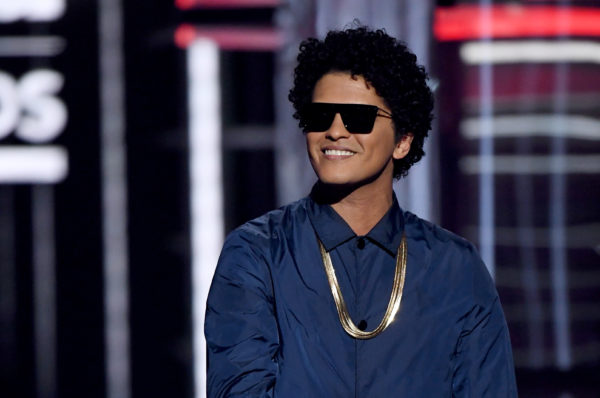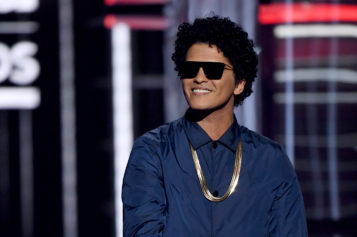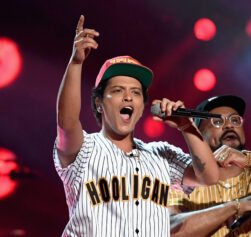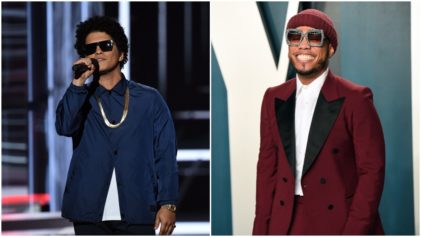Following the persistent claims of cultural appropriation in his music, Bruno Mars has spoken out to refute those allegations.
The topic was broached on the March 5 episode of “The Breakfast Club” in which the singer appeared.

In response to host Charlamagne Tha God’s suggestion that some had called Mars a “cultural thief” because of the heavy influence of Black music and culture in his work, he said, “You can’t find an interview where I haven’t talked about the entertainers who have come before me. The only reason I’m here is because of James Brown, Prince, Michael.”
“This music comes from love, and if you can’t hear that, I don’t know what to tell you,” he continued.
Since Mars (whose father is half Puerto-Rican, half Ashkenazi Jewish, and mother was of Filipino ancestry) burst onto the scene in 2009, his race has been the source of endless scrutiny, particularly in the accusations on social media of cultural appropriation by using his racial ambiguity to profit from Black music, and criticism for imitating the sound of past artists.
However, the Grammy-winning artist does not entertain the denunciations, while publicly supporting Black artists receiving credit for their work.
“It comes with the gig,” Mars said. “There’s real merit to what people are saying about Black entertainers not getting their flowers. And I champion that, I’m with that.”
He indicated that he consistently gives credit to the creators of music styles he borrows or samples, and believes that the progression of the industry is dependent of new musicians taking and innovating upon the work of older ones.
“It’s the truth,” Mars stated. “It’s not a secret. We’re wearing the inspiration on our sleeve. What is the point, if us as musicians can’t learn from the guys that have come before us?”
“I hope that later on, down the road, there’s going to be a band that’s taking what we did and flipping that, and freaking that, and putting their own spin on it — because if they don’t, then what was the point of us doing this?”
In March in 2018, the cultural appropriation argument went public when writer Seren Sensei made her claims against Mars in a Twitter clip from “The Grapevine,” a web series that delves into topics concerning the Black community.
“Bruno Mars 100% is a cultural appropriator. He is not black, at all, and he plays up his racial ambiguity to cross genres,” Sensei said.
“What Bruno Mars does, is he takes pre-existing work and he just completely, word-for-word recreates it, extrapolates it,” she added. “He does not create it, he does not improve upon it, he does not make it better. He’s a karaoke singer, he’s a wedding singer, he’s the person you hire to do Michael Jackson and Prince covers. Yet Bruno Mars has an Album of the Year Grammy and Prince never won an Album of the Year Grammy.”
While some on social media agreed with Sensei’s take, the public accusation also brought out a flood of supporters, many of them in the music business, who wanted to defend Mars.
Music legend Stevie Wonder was questioned about the issue by TMZ, who asked him for his thoughts on the controversy surrounding Mars.
“Here’s the thing, God created music for all of us to enjoy,” Wonder said. “So we cannot limit ourselves by people’s fears and insecurities. He’s a great talent, so all the other stuff is just bulls—. He was inspired by great musicians and great artists and songwriters. So it’s cool.”
Former lead vocalist of R&B/funk group The Gap Band, Charlie Wilson, praised Mars in a Twitter post, writing that he was bringing back “that classic New Jack / R&B sound to the masses when it was left for dead years ago and hard for artists to get that sound back on mainstream radar.”
Wilson also added, “Bruno’s songs on this album are original and no different from any other artist pulling inspiration from genres before him.”
Grammy-nominated rapper Rapsody tweeted, “Keep making that funky ish, @BrunoMars!!!! Do you always ❤️.”
Hip-hop music producer 9th Wonder wrote, “So is it Bruno Mars fault that…he was influenced by BabyFace, Teddy Riley, Jimmy Jam and Terry Lewis…around the same time from a hip-hop side I was influenced by DJ Premier, Pete Rock, and The Beatminerz? This is a Sociology study on influence and exposure….”
Fans also noted previous interviews in which Mars gave credit to the other genres and people that created that created music, specifically emphasizing the importance of Black culture.
“When you say ‘black music,’ understand that you are talking about rock, jazz, R&B, reggae, funk, doo-wop, hip-hop and Motown,” he said in an interview with Latina magazine in February 2017. “Black people created it all. Being Puerto Rican, even salsa music stems back to the Motherland [Africa]. So, in my world, black music means everything. It’s what gives America its swag.
“I’m a child raised in the ’90s,” he added. Pop music was heavily rooted in R&B from Whitney, Diddy, Dr. Dre, Boyz II Men, Aaliyah, TLC, Babyface, New Edition, Michael, and so much more … I wouldn’t be here if it wasn’t for these artists who inspired me.”


